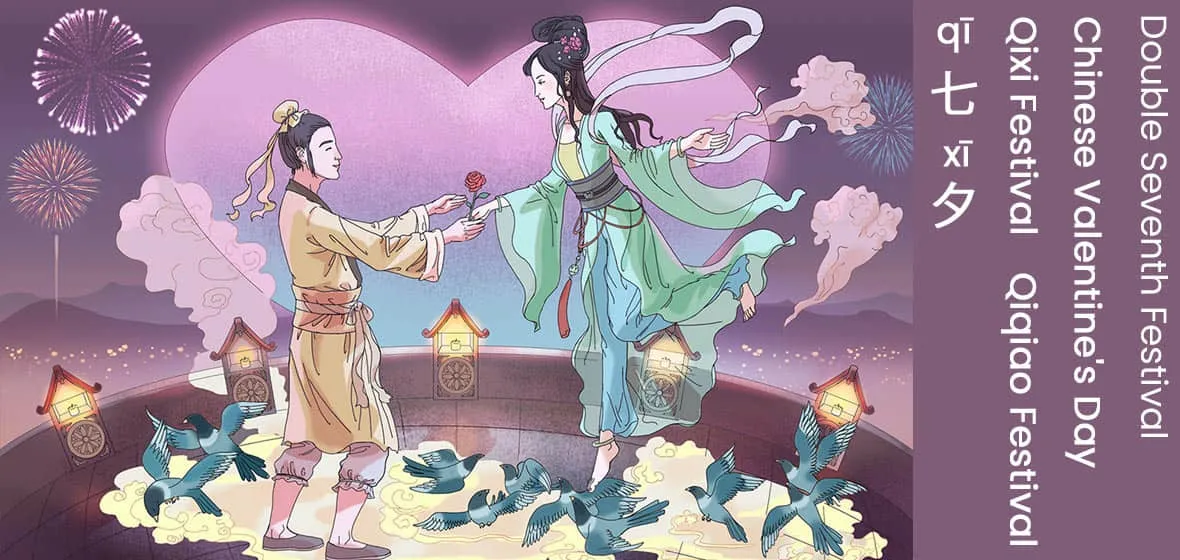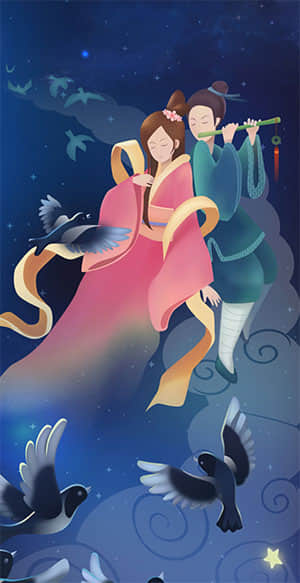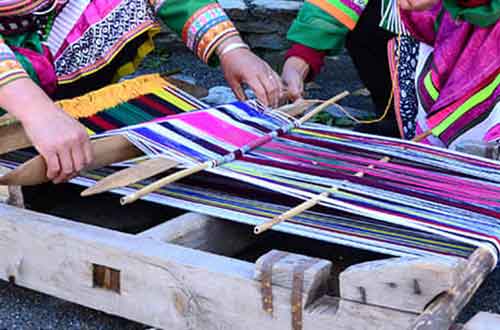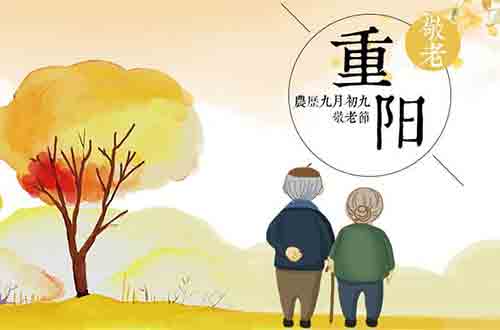Double Seventh Festival | Qixi Festival

In China, the Double Seventh Festival, also called Qiqiao Festival, falls on the seventh day of the seventh lunar month. In ancient times, it was the most romantic occasion in the traditional Chinese festival calendar and an especially important day for girls. The festival originated from the romantic legend of two lovers, Niulang and Zhinv, and celebrates their meeting on this night . All girls pray to Zhinv for skillful hands and a perfect marriage.
The Double Seventh Festival Dates:
| Year | Date | Weekday |
|---|---|---|
| 2026 | August 19 | Wednesday |
| 2027 | Auguest 8 | Sunday |
| 2028 | Auguest 26 | Saturday |
| 2029 | Auguest 16 | Thursday |
| 2030 | Auguest 5 | Monday |
| 2031 | Auguest 24 | Sunday |
| 2032 | Auguest 12 | Thursday |
| 2033 | Auguest 1 | Monday |
Click here to see China Public Holiday Calendar
The Legend of Double Seventh Festival
Double Seventh Festival is closely related to the romantic tale about Niulang and Zhinv, which is one of the four great love legends in Chinese folklore.
 Niulang and Zhinv
Niulang and Zhinv
Legend has it that an honest and loyal cowherd named Niulang had lost his parents and lived with his brother and sister-in-law. But the sister-in-law, Mrs. Ma, was a malevolent woman. One day, he was compelled to pasture oxen as Mrs. Ma demanded. He only had 9 oxen, but he could come back home when he had 10 oxen. He went to a lush green hill alone, sitting sadly under a tree without any ideas.
At this point, he was told by an old man, “There is an old and ill ox on Funiu Hill. You could take it home after feeding and caring for it.”
Niulang crossed the mountains and finally found the ill ox. He was an ox god, and his leg was broken when he was punished by being expelled from heaven. The ox recovered fast with Nulang’s great care, and he eventually took ten oxen back home.
Mrs. Ma was unhappy about it, and she continued to maltreat him and eventually got rid of him and the ox. After that, the old ox always accompanied him everywhere.
One day, Zhinv, a weaver fairy, and others came down to earth and bathed in a river. Niulang got to know Zhinv with the old ox’s help. They fell in love, married, and had two children and a happy life. It was a pity that good times didn’t last long. The king of the heaven knew about it and he was very angry. The Queen Mother of the West took Zhinv back to heaven, and so the faithful couple were separated.
Niulang was desolate when he found his wife had left. At the same time he was told by the ox god that it would die soon. The ox god advised Niulang to peel its skin and make a pair of shoes and a cloak after it died. Wearing the ox’s skin, he could fly to heaven. Niulang did it according to the ox’s will and brought their two children to look for Zhinv. Just at the moment before he reached Zhinv, the Queen Mother of the West took her hairpin to create the Milky Way, separating them forever. They wept bitter tears of disappointment. But their authentic love moved all magpies, and they flew up in to heaven to form a bridge over the Milky Way. Niulang and Zhinv could then walk across the bridge and have a family reunion. The Queen Mother of the West had to allow them to meet on the seventh day of the seventh lunar month every year.
This legend originated from astrolatry (the worship of heavenly bodies) which belongs to an ideology of worship of Nature and Wisdom. There are two bright stars, one on each side of the Milky River bank. One is named Niulang (the star Altair), and the other one is Zhinv (the star Vega). According to the thinking in ancient times, people imagined that they were this unfortunate couple.
Zhinv was compelled to return to heaven after she married. It is a classic example of marriage without freedom in Chinese feudal society. This story reflected that obedience to authority is one of the Chinese traditions formed in feudal society over several thousand years. But Niulang pursued his wife to heaven, and he was admired by people for his unswerving loyalty to love.
How do People Celebrate the Double Seventh Festival?

On the night when Niulang and Zhinv met, girls offer melons and other fruits, and worship toward the sky to pray for bright minds and clever hands, because Zhinv was a weaver fairy. In ancient times, skillful sewing was very important to them. They also pray for a wonderful marriage which will decide their life-long happiness.
Listening Night Talk
Legend has it that in the quiet of the night, girls will have a faithful marriage if they can hear the sound of Niulang and Zhinv talking under a pumpkin shed .
Worshiping the weaver fairy (the star Vega)
Young women and girls fast during the day, burn incense and worship, then they sit around a table to talk about their thoughts about a great marriage. In Chinese feudal society, people were not free to choose their own marriage partner, especially the women, and they didn’t have the right of free speech, not to mention freedom. Therefore, young girls didn’t have any other way; they only looked forward to this day, and worshiped Zhinv as they hoped for an ideal partner.
Pleading to be endowed with Sewing Skills
Girls watch the starry sky to find the Niulang and Zhinv stars and plead for skills. The obvious way is by displaying their needlework. Offering melons on the altar is to pray for an increase of agricultural products and continuous descendants.
Spider Divination
Girls catch spiders, putting them into small boxes, and check the spider’s web on the next day. The more intense the spider’s web is, the more clever the hands of the girls will be.
Needle Divination
On that night, unmarried girls perform a small test by placing a needle on the water’s surface. If the needle doesn’t sink, the girl is considered to be ready to find a good husband.
Paying tribute to Kuixing
Kuixing is the four stars in the bowl of the Big Dipper, who is a god in charge of literature in Chinese mythology. On this night, men worship Kuixing to pray for passing the Imperial examination.
Appealing for beauty
Girls use petal juice to dye their nails, which is not only for beauty but also to keep their fingers healthy. They also use dew to spread on their hands and face while making great wishes. They believe that the dew on that night is tears of Zhinv.
In Chinese ancient times, the family mode of men tilling and women weaving is the basic economic production. In these festival activities, women recognize and strengthen their character gradually, which was the requirement of society transformed to their own specification.
Greetings for Qixi Festival / The Chinese Valentine's Day
七夕节快乐 qī xī jiē kuài lè: Happy Qixi Festival!
我爱你 wǒ ài nǐ: I love you!
愿你一生都充满爱和浪漫 yuàn nǐ yī shēng dōu chōng mǎn ài hé làng màn: I wish you a lifetime full of love and romance.
 How do People Celebrate the Double Seventh Festival?
How do People Celebrate the Double Seventh Festival?  The Gift for Double Seventh Festival
The Gift for Double Seventh Festival  Top 5 Romantic Destinations in China
Top 5 Romantic Destinations in China  The Double Ninth Festival
The Double Ninth Festival